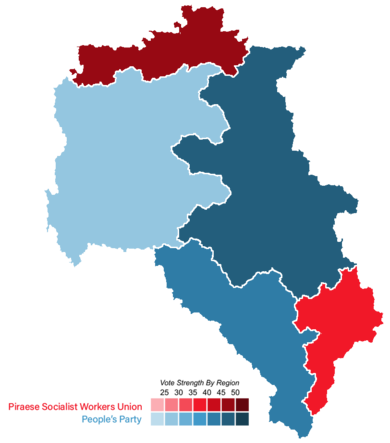1980 Piraean general election: Difference between revisions
| Line 91: | Line 91: | ||
===1979 national plebiscite=== | ===1979 national plebiscite=== | ||
{{main|1979 Piraean national plebiscite}} | {{main|1979 Piraean national plebiscite}} | ||
The year prior to the general elections, the military junta proposed and celebrated a [[1979 Piraean national plebiscite|national plebiscite]] aimed to legitimise a new term of the recently elected junta leader, [[Ioannis Christodoulopoulos]], who was appointed by the {{wp|dictator}} of the [[Second Piraean Republic]], [[Konstantinos Athanopoulos]], in the minutes prior to his death. The plebiscite counted with an important campaign of the two options, ''"Yes"'' (''Ναι''; endorsed by the political right and the junta) and ''"No"'' (''Όχι''; endorsed by the left and society groups in clandestine). | The year prior to the general elections, the military junta proposed and celebrated a [[1979 Piraean national plebiscite|national plebiscite]] aimed to legitimise a new term of the recently elected junta leader, [[Ioannis Christodoulopoulos]], who was appointed by the {{wp|dictator}} of the [[Second Piraean Republic]], [[Konstantinos Athanopoulos]], in the minutes prior to his death. The plebiscite counted with an important campaign of the two options, ''"Yes"'' (''Ναι''; endorsed by the political right and the junta) and ''"No"'' (''Όχι''; endorsed by the left and society groups in clandestine), which gradually normalised political activity in the country. | ||
However, the rejection of the junta's proposal, forced the military to initiate contacts with the political world to host elections and transition towards democracy. Christodoulopoulos held several contacts with the [[Ioannis Apostolou]] ([[People's Party (Piraea)|People's Party]]) and [[Andrianos Rodiales]] ([[PSEE]]). | |||
===1979 Hankssun 300 Pact=== | ===1979 Hankssun 300 Pact=== | ||
Revision as of 00:57, 25 January 2023
| |||||||||||||||||||||||||||||||||||||
All 125 seats to the Piraean Courts 61 seats needed for a majority | |||||||||||||||||||||||||||||||||||||
|---|---|---|---|---|---|---|---|---|---|---|---|---|---|---|---|---|---|---|---|---|---|---|---|---|---|---|---|---|---|---|---|---|---|---|---|---|---|
| Turnout | 79.8% | ||||||||||||||||||||||||||||||||||||
This lists parties that won seats. See the complete results below. | |||||||||||||||||||||||||||||||||||||
 Most voted-for party by region in Piraea proper | |||||||||||||||||||||||||||||||||||||
| |||||||||||||||||||||||||||||||||||||
The 1980 Piraean general election was the first democratic election of Piraea after the military dictatorship to elect the members of the Piraean Courts (now Senate) and the new premier of the republic. It was extraordinarily held on 1 February 1980 and marked the start of the Piraean metapolitefsi.
The elections were agreed in 1979, after the military junta lost the national plebiscite in which it sought to legitimise a new leader. In September of 1979, the two largest parties of Piraea, the PSEE and the People's Party, signed, together with other minor legal parties, the conditions for the transition under the Hankssun 300 Pact; the military junta agreed the disassociation from the new government and institutions on the conditions of inmunity and the outlaw of the Piraese Section of the Workers' International. Most of the members of the illegal PTED participated under the Progressive Federation platform together with other clandestine leftist minor groups.
After the general elections the 1st Legislature of the Piraean Senate were formed, with an absolute majority from the People's Party, which counted with the PSEE as the main opposition party. The new premier, Ioannis Apostolou was invested with the votes of LK and Centre Union, while the post-Functionalist far-right proposed their abstention.
Background
1979 national plebiscite
The year prior to the general elections, the military junta proposed and celebrated a national plebiscite aimed to legitimise a new term of the recently elected junta leader, Ioannis Christodoulopoulos, who was appointed by the dictator of the Second Piraean Republic, Konstantinos Athanopoulos, in the minutes prior to his death. The plebiscite counted with an important campaign of the two options, "Yes" (Ναι; endorsed by the political right and the junta) and "No" (Όχι; endorsed by the left and society groups in clandestine), which gradually normalised political activity in the country.
However, the rejection of the junta's proposal, forced the military to initiate contacts with the political world to host elections and transition towards democracy. Christodoulopoulos held several contacts with the Ioannis Apostolou (People's Party) and Andrianos Rodiales (PSEE).
1979 Hankssun 300 Pact
Campaign
Censorship and observers
Televised debates
Participating parties
Results
Government formation and investiture
| Candidate | Date | Vote | Total | ||||||||
|---|---|---|---|---|---|---|---|---|---|---|---|

|
15 February 1980 Absolute majority required (61/125) |
Yes |
68 | 8 | 76 / 125
| ||||||
| No | 40 | 3 | 3 | 1 | 47 / 125
| ||||||
| Abs. | 1 | 1 | 2 / 125
|

